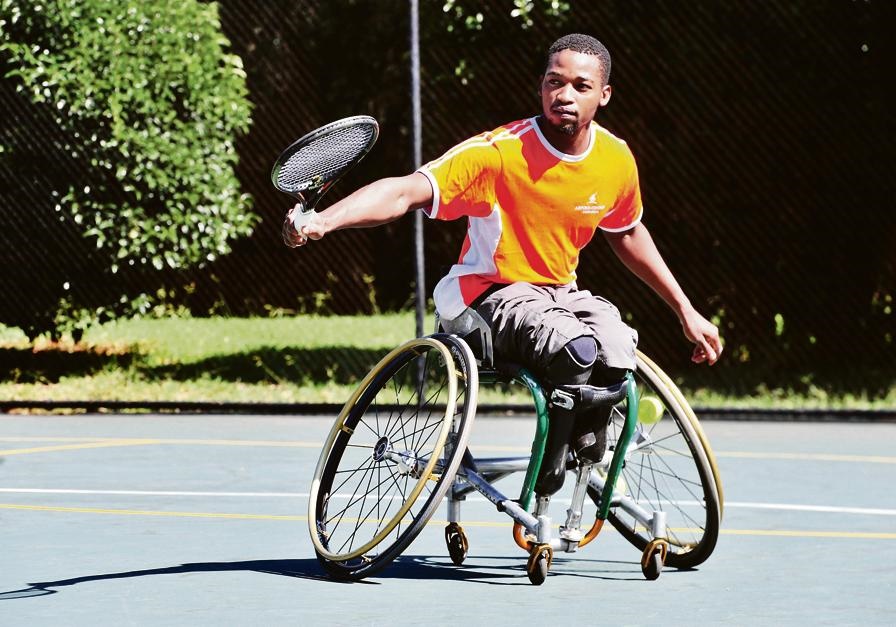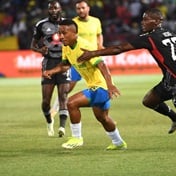
SA wheelchair tennis ace Evans Maripa tells Daniel Mothowagae that he is ready to stop living in the shadow of his more famous team-mates
Despite his top rating in his category, Evans Maripa lives in the shadow of SA’s poster wheelchair players, Lucas Sithole and Kgothatso “KG” Montjane. He feels that a Paralympic Games medal will pull him out of his relative obscurity.
Maripa has been South Africa’s top men’s singles player for six years and is currently ranked 16th in the world.
He, together with Sithole (rated third globally in the quads) and Montjane (eighth in the women’s world singles) have already secured their berths at the Paralympics in Rio de Janeiro, Brazil, later this year.
The energy and enthusiasm of Maripa paint a clear picture of his ambitions during his interview with City Press this week.
Before he takes to the court, the 25-year-old Maripa weaves his custom-made wheelchair back and forth in a pattern resembling that of Formula 1 drivers warming up their tyres before a race.
His close control and intense speed are breathtaking.
“Many people know of KG and Lucas, but it also started to happen for me here,” Maripa tells City Press by way of introduction during his training at the University of Johannesburg (UJ) tennis courts this week.
He has done it all, though is yet to break into the world’s top 10.
All three players have used this facility, which was home to them for the past six years. Montjane recently relocated to Pretoria, says Maripa.
Maripa found early success on the court after breaking into wheelchair tennis in 2007.
His first major triumph was a gold in the men’s singles at the Asian Para Games in Tokyo in 2009.
“It happend so quickly for me,” beams the lad from Moletjie in Limpopo, who climbed up to the national number one spot in a matter of three years.
“I won gold in the doubles in just my second national camp in 2007. From there on, I just got better, not realising I can make a living out of tennis.
“Looking at my background and how we struggled at home, I started making money because my family found it hard to pay my school fees. I was able to provide with the little I made from playing tennis. Unfortunately, my studies suffered because I concentrated more on the sport.”
Maripa takes a deep breath and sounds like he has a lump in his throat when he relates the passing of his mother in 2014.
“I felt like I had lost everything, but I had to be strong and move on. We were very close and I didn’t spend much time with my dad.”
His siblings, two sisters and a younger brother, are now in the care of his father in Pretoria.
“I visit them frequently,” he adds.
For someone who globe-trots and sleeps at the best hotels today, Maripa has not forgotten where and how it all started for him.
“A guy named Velaphi Mkhabela started the wheelchair thing at school in Limpopo with KG. I adapted quickly because I used to play table tennis and it was not a difficult experience to handle a racket. We used a little space in the school hall, about half a tennis court size, and had chairs for a net.
“Velaphi often said the game would make me a better person and I’d win some money one day. This after he won about R600 in some competition at the time.”
Maripa, who regards Montjane as his big sister, remains in touch with their mutual mentor Mkhabela.
“Marips”, as his peers call him, might have dominated locally but there is still a piece missing from his career picture.
A giveaway of this is that his profile on the International Tennis Federation database has missing information, such as his birthplace and playing style.
“Such information is only added when you’re in the top 10,” explains Maripa, whose best ranking in the world was 11th last year, in both the singles and doubles table.
“I need to improve my world ranking to be in the top 10. It opens up many opportunities, including a spot in the grand slams if you are in the top eight. That’s where I want to be, especially after my first experience as a guest of Team SA when KG and Lucas were there [at the Australian Open in January].”
Sithole won the quad doubles title, while Montjane lost the singles and doubles in the women’s competition at the Melbourne event.
Maripa, who was born with a congenital birth defect and had both legs amputated below the knees, dreams of having “Team Evans” one day.
This because he must still share coaches Khotso Mashego and Holger Losch with the group at UJ.
“If I can have a personal physio and psychologist, Team Evans will be complete. At the moment, it’s just my coach and me. I spend most of my time with Khotso, but he trains other players too.”
Maripa and his team-mates rely on the Airports Company of SA (Acsa) to keep them running.
“Acsa invested in us when not many were interested in wheelchair tennis. They provide wheelchairs, run tournaments ... they are our main sponsor.”
Although the group is still waiting for new wheelchairs to prepare for the Paralympics, Maripa is not complaining, since there is a potential sponsorship in the pipeline.
“I was approached by a company called ESP; it’s a branding firm in the UK. They are willing to offer me a sponsorship, but we’re still in talks.
“It is sad that people overseas know more about me than here at home. Yes, I understand the economic challenges, but if I can just get a little extra cash to push me and to be able to afford a physio and a psychologist...”
Maripa, whose strength lies in a powerful forehand, lit up when he spoke about the looming competition at the Rio Games.
He was at the London 2012 Paralympics but was knocked out in the second round in the singles and suffered the same fate in the first round of the doubles.
“I went there for fun and just for the experience. There were lots of top players in London – 64.
When I was asked what my goal was then, I said, ‘If I can win just one game, I’ll be happy.’”
Four years on, his mentality will be different for the Rio Games in September.
“I want to go out there and make the country proud. It’s all about preparing and getting the right equipment.
Physically, I’m in good shape because I’m naturally a healthy player. I’ve beaten several players in the top seven. The goal is to make the semis. I want to play until my arm says no, to perhaps reach the final. If I make it, that will be the best way to introduce myself to South Africa – as a medallist.”
An ardent Kaizer Chiefs fan, Maripa’s other dream is to meet the Amakhosi players at their village in Naturena, Johannesburg.
“I’d be happy to take a photo with the entire team and be presented with a signed shirt.”
Benoni Open (Gauteng East Tennis Complex)




 Publications
Publications
 Partners
Partners








